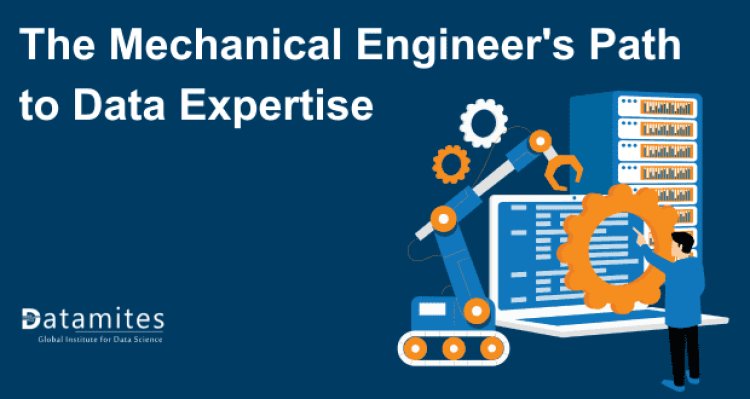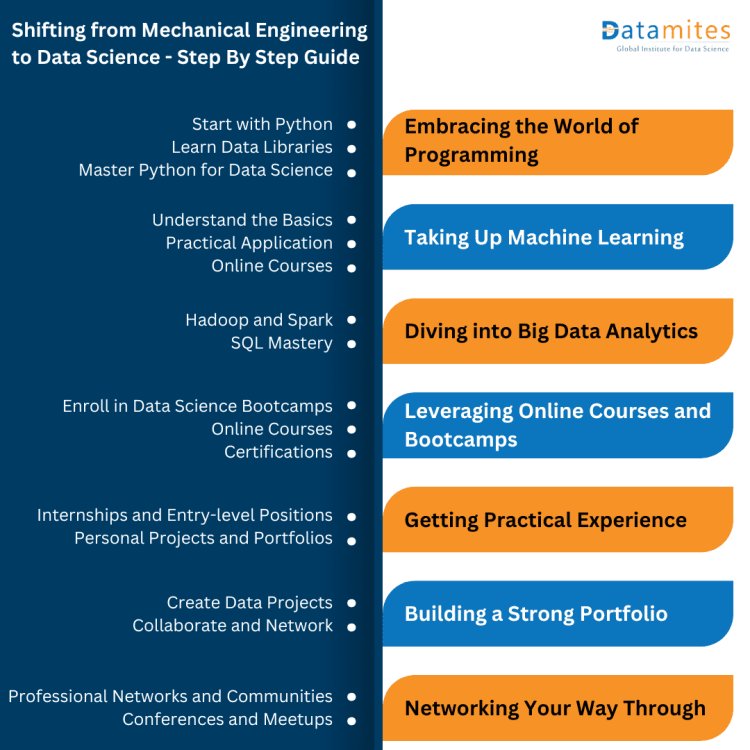Engineering a Future in Data Science: The Mechanical Engineer's Path to Data Expertise

In the innovative realm of technology, the paths of mechanical engineering and data science are increasingly converging. This trend reflects the current job market's shift towards a data-centric approach, where the analytical prowess of mechanical engineers aligns seamlessly with the demands of data science. The leap from designing machinery to deciphering data patterns is not just about changing job titles; it's an evolution in career trajectory, opening new doors in an era where data is king.
As industries integrate data analytics into core operations, mechanical engineers are uniquely positioned to bring a fresh, problem-solving perspective to the world of data science, making this transition not only possible but also highly sought after in today's job market.
The World of Mechanical Engineering: Crafting Solutions for Progress
Mechanical engineering is all about designing and building things that move or use energy. It's like being a problem solver for machines! Mechanical engineers work on a wide range of projects, from creating engines for cars to designing robots for factories. They use math and science to figure out how things should work and then make them a reality. Whether it's making sure a bridge is strong enough or designing a new type of prosthetic limb, mechanical engineers are the ones who make it happen.
In mechanical engineering, professionals tackle tasks like designing machines, testing materials for strength, and improving energy efficiency. They might work in teams to brainstorm ideas, use computer programs to model designs, or even get hands-on building prototypes. From creating safer airplanes to developing renewable energy solutions, mechanical engineers play a crucial role in shaping the world around us.
Read These Articles:
- A Comprehensive Guide on the Data Science Lifecycle
- Exploring Data Science Job Opportunities and Salaries Worldwide
- What is Data Science in Simple Words?
Contrasting Data Science and Mechanical Engineering
Data science and mechanical engineering differ in how they work and what they focus on. Data science looks at big sets of information using math and computers to find patterns and make predictions. Meanwhile, mechanical engineering is about designing and improving physical things, like machines and systems, using principles of physics and math.
In data science, people use computers and math to analyze data, while in mechanical engineering, they use software for designing and physical models for testing. Despite these differences, both fields help make things better. Data science finds insights from information, while mechanical engineering shapes the world around us. By combining their strengths, they offer different solutions to tough problems in many industries.
Common Ground: Mechanical Engineering and Data Science
Mechanical engineering and data science share several commonalities that make the transition between the two fields smooth and promising. Despite apparent differences, both fields share a fundamental bedrock that serves as a springboard for this career shift.
Analytical Thinking:
Analytical thinking, inherent to mechanical engineering, proves invaluable in data science. Mechanical engineers adeptly dissect complex systems and problems, a skill directly applicable to deconstructing data sets and extracting insights in data science.
Mathematical Mastery:
Mathematics, a cornerstone in both fields, is extensively utilized by mechanical engineers. Concepts like calculus and statistics seamlessly align with the quantitative demands of data science, offering mechanical engineers a strong mathematical toolkit for analysis and modeling.
Problem Solvers Unite:
Problem-solving is ingrained in both mechanical engineering and data science. Mechanical engineers, accustomed to optimizing designs and troubleshooting systems, bring a natural problem-solving mindset that translates seamlessly to data challenges in data science.
Building a Strong Base:
The shared foundations of analytical thinking, mathematical proficiency, and problem-solving acumen position mechanical engineers as ideal candidates for a transition into data science. These skills serve as a solid base upon which mechanical engineers can construct a successful career in the data realm.
While there are significant similarities between mechanical engineering and data science, aspiring transitions must focus on upskilling to fully harness their potential in the data realm. With dedication and continuous learning, mechanical engineers can confidently navigate this transition and thrive in the dynamic field of data science.
Read These Articles:
- Data Science Career Scope in India
- Artificial Intelligence Career Scope in India
- Data Analyst Career Scope in India
Shifting from Mechanical Engineering to Data Science - Step By Step Guide
Shifting from mechanical engineering to data science is an achievable feat, but it requires a concerted effort to bridge the skill gap effectively. In this section, we will explore concrete strategies that will empower mechanical engineers to acquire the essential skills needed in data science, with a particular focus on programming, machine learning, and big data analytics tools.
Embracing the World of Programming
Start with Python: Python stands as the cornerstone of data science programming. Its simplicity and versatility make it an ideal starting point. Begin your journey by immersing yourself in Python tutorials and courses to establish a robust programming foundation.
Learn Data Libraries: Dive deeper into Python by acquainting yourself with crucial data manipulation libraries like Pandas and mastering data visualization tools such as Matplotlib and Seaborn. These tools are indispensable for data preprocessing and exploratory analysis.
Master Python for Data Science: To advance your programming skills for data science, consider enrolling in specialized Python courses tailored to data analysis. These courses cover essential libraries like NumPy, SciPy, and Scikit-Learn, which are fundamental for data analysis and machine learning.
Taking Up Machine Learning
Understand the Basics: Commence your machine learning journey by grasping fundamental concepts such as supervised and unsupervised learning, regression, and classification. Utilize textbooks and online courses to gain a comprehensive understanding.
Practical Application: Learning by doing is invaluable. Engage in small-scale machine learning projects to gain hands-on experience. Platforms like Kaggle offer datasets and competitions, providing a playground for practical application.
Online Courses: Delve deeper into machine learning through comprehensive online courses offered by reputable platforms like DataMites.
Diving into Big Data Analytics
Hadoop and Spark: Big data analytics is a pivotal component of data science. Familiarize yourself with technologies like Hadoop and Apache Spark, which facilitate distributed data processing. Abundant online resources and tutorials are available for self-learning.
SQL Mastery: Proficiency in SQL is paramount for efficient data retrieval and manipulation. Practice your SQL skills with online databases like PostgreSQL and MySQL, gaining valuable hands-on experience.
Leveraging Online Courses and Bootcamps
Enroll in Data Science Bootcamps: Consider enrolling in data science bootcamps that offer intensive, immersive learning experiences. These programs typically cover a broad spectrum of data science topics, including programming, machine learning, and big data tools.
Online Courses: Explore a plethora of online data science courses available on platforms. These courses provide flexibility and allow you to learn at your own pace, making them ideal for working professionals.
Certifications: Pursue certifications in data science or related fields. Data Science Certificates from reputable bodies like IABAC can enhance your credibility and demonstrate your commitment to acquiring relevant skills.
Getting Practical Experience
Internships and Entry-level Positions: Gaining hands-on experience through data science internships or junior roles is crucial. They provide real-world experience and help in understanding the day-to-day responsibilities of data professionals.
Personal Projects and Portfolios: Building your own projects and maintaining a portfolio on platforms like GitHub is highly recommended. It demonstrates your skills and interest in the field.
Building a Strong Portfolio
Create Data Projects: Develop a portfolio of data science projects that showcase your practical skills. Real-world projects serve as tangible evidence of your abilities and are invaluable when seeking employment in the field.
Collaborate and Network: Engage with the data science community by joining forums, attending meetups, and collaborating with peers on projects. Networking can lead to valuable insights, mentorship, and job opportunities.
By embracing these strategies and dedicating yourself to continuous learning, mechanical engineers can successfully bridge the skill gap and embark on a fulfilling journey into the world of data science.
Networking Your Way Through
Professional Networks and Communities: Joining communities such as those on LinkedIn, Reddit (e.g., r/datascience), and Stack Overflow can be beneficial for learning, sharing knowledge, and networking.
Conferences and Meetups: Attending industry conferences and local meetups helps in staying updated with the latest trends and networking with professionals in the field.
A combination of formal education, self-study, practical application, and networking forms the backbone of a successful transition into data science or a related field. Continuous learning and adapting to new technologies and methodologies are crucial in these ever-evolving fields.

Read These Articles:
- Data Science Course Fee in Bangalore
- Data Science Course Fee in Chennai
- Data Science Course Fee in Pune
Understanding Data Science Potential for Mechanical Engineers
Transitioning from mechanical engineering to data science entails mastering programming, math, statistics, and domain knowledge. However, mechanical engineers possess a solid math foundation, easing this shift. Integrating data science into mechanical engineering not only enhances engineers' capabilities but also offers lucrative career paths with advanced problem-solving opportunities. The future holds promising prospects as industries rely more on data-driven decisions.
Next, we'll delve into success stories of mechanical engineers thriving in data science roles.
Roshan Betediya's Transition to Data Science: Roshan Betediya, a former mechanical engineer, smoothly shifted to a data science career by dedicating himself to learning new skills. He relied on an online data science program to build a solid foundation, emphasizing core concepts and practical applications. Betediya's journey highlights the value of dedicated learning and structured training programs in enabling successful career transitions.
Raja Vignesh's Transition to Machine Learning Engineering: Raja Vignesh, originally an architect, shifted his career to become a machine learning engineer. This journey likely involved acquiring specialized knowledge in machine learning algorithms, programming, and data handling techniques. Such a transition demonstrates the versatility of machine learning as a field and its accessibility to professionals from diverse backgrounds.
Neethan Kumar's Journey from Mechanical Engineering to ML Engineering: Neethan Kumar, a fresh mechanical engineering graduate, navigated his way into machine learning engineering with no prior knowledge of data science or machine learning. He accomplished this through a certified data scientist course, eventually securing a position as a Machine Learning Engineer with an impressive salary. Kumar's experience highlights the value of targeted educational programs in enabling career shifts and the growing demand for machine learning skills across industries.
Pragnya Narasimha's Path to Data Analyst: Pragnya Narasimha's story is another example of a mechanical engineer transitioning into the field of data analysis. This change likely involved learning data processing, analysis techniques, and possibly programming skills specific to data analysis tools and software.
These stories show that with proper training, dedication, and focus on learning the right skills, moving from mechanical engineering to data science, machine learning, or data analysis is possible. They also demonstrate how these fields are broad and welcome people from different backgrounds who are ready to learn and adapt to new technology.
Transitioning from mechanical engineering to data science isn't just possible, but it also brings new challenges, skill growth, and potentially higher pay. Mechanical engineers offer valuable analytical and problem-solving abilities to data science, seen in areas like predictive maintenance and supply chain management. Although learning involves new skills like programming and statistics, mechanical engineers' math background gives them an edge.
DataMites provides comprehensive data science training, including Certified Data Scientist Courses, aimed at preparing learners for successful careers in data science. Covering all aspects of the Data Science Lifecycle, the program ensures mastery of foundational and advanced concepts. Certification from IABAC® and NASSCOM® boosts learners' professional credibility in the data science community.
